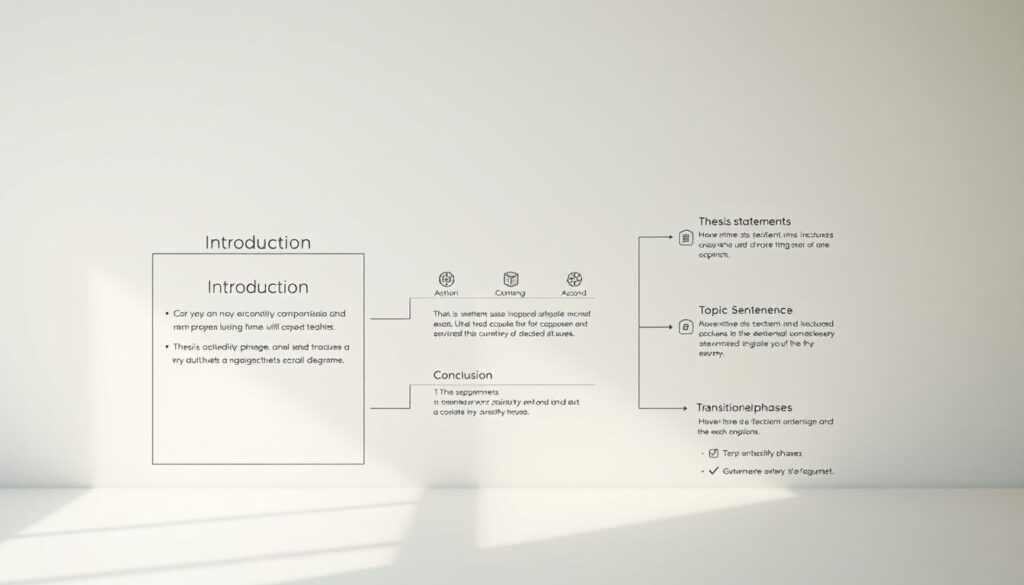Have you ever wondered why some students excel in the essay section while others struggle to meet the mark? The answer lies in mastering the right techniques and understanding the advantages and disadvantages of various approaches. This guide is here to help you unlock your potential and achieve the score you deserve.
Writing Task 2 contributes a significant 66% to your overall writing score. With only 40 minutes to craft a well-structured essay, preparation is key. Our strategies are backed by reliable data from IDP webinars and sample essays, ensuring you have the tools to succeed.
In this article, we’ll explore proven methods to tackle the question effectively, avoid common pitfalls, and maximize your band score. Whether you’re aiming for a Band 6 or striving for a Band 8, our expert tips will guide you every step of the way.
Key Takeaways
- Writing Task 2 makes up 66% of your overall writing score.
- You have 40 minutes to complete the essay section.
- Understanding the question is crucial for a high band score.
- Our strategies are based on IDP webinars and sample essays.
- Practicing under time constraints can boost your confidence.
Introduction to IELTS Writing Task 2
Mastering the essay section can significantly boost your overall score. This part of the test requires you to write at least 250 words using formal language. It’s a critical component, making up two-thirds of your total writing mark.
Whether you’re taking the Academic or General Training version, the structure remains similar. You’ll need to address all parts of the question clearly and provide relevant examples. This ensures your essay meets the examiner’s expectations.
Understanding the differences between the two versions is key. Academic essays often focus on complex topics, while General Training essays are more practical. Both, however, require a well-organized response to achieve a high band score.
Our guide is designed to help you navigate these challenges. We’ll provide expert insights and practical tips to improve your writing. Whether you’re aiming for a Band 6 or a Band 8, these strategies will set you on the right path.
By following our advice, you’ll gain the confidence to tackle any essay topic. Let’s dive into the details and unlock your full potential.
Understanding IELTS Task 2 Writing
To achieve a high score, it’s essential to understand the different essay types and how they are evaluated. This knowledge helps you tailor your response to meet examiner expectations. Let’s break down the key components to ensure you’re fully prepared.

Essay Types Explained
There are five common essay types you may encounter. Each requires a specific approach to address the question effectively. Here’s a quick overview:
- Opinion Essays: You must present your viewpoint and support it with reasons and examples.
- Discussion Essays: These require you to explore both sides of an issue before giving your opinion.
- Problem-Solution Essays: Identify a problem and propose practical solutions.
- Advantage-Disadvantage Essays: Discuss the pros and cons of a given topic.
- Direct Question Essays: Answer specific questions with clear explanations and examples.
Understanding these types ensures you can adapt your writing style to the question. For example, a problem-solution essay demands a structured approach, while an opinion essay requires strong arguments.
Marking Criteria Breakdown
Examiners evaluate your essay based on four key criteria. Knowing these helps you focus on areas that matter most:
- Task Response: Address all parts of the question and provide relevant examples.
- Coherence and Cohesion: Ensure your essay flows logically with clear paragraphing.
- Lexical Resource: Use a wide range of vocabulary accurately.
- Grammatical Range and Accuracy: Demonstrate varied sentence structures with minimal errors.
By mastering these criteria, you can craft essays that meet the standards for a Band 9. For example, using advanced vocabulary and varied sentence structures can significantly boost your score.
We’ve outlined clear solutions to help you overcome common challenges. Whether it’s structuring your essay or understanding the marking criteria, these strategies will guide you toward success.
Test Format and Timing Strategies
Effective time management is the cornerstone of success in any timed exam. For the essay section, you have 40 minutes to craft a well-structured response. This time includes planning, writing, and reviewing your work. Understanding the format and pacing yourself is crucial to achieving a high score.

Managing Your 40-Minute Essay
To make the most of your time, follow these steps:
- Plan First: Spend 5 minutes brainstorming ideas and creating an outline. This ensures your essay has a clear structure.
- Write Efficiently: Allocate 30 minutes to write your essay. Focus on clarity and coherence, ensuring each paragraph flows logically.
- Review and Edit: Use the last 5 minutes to check for grammar, spelling, and punctuation errors. This step can significantly improve your score.
Transitioning Between Tasks
Moving from one task to another can be challenging. Here’s how to stay focused:
- Set Mental Boundaries: Once you finish Task 1, take a moment to reset your mind before starting Task 2.
- Stay Organized: Keep your notes and outline handy to avoid wasting time.
- Practice Transitions: Use mock tests to simulate the exam environment and improve your ability to switch tasks smoothly.
Educational videos can also help you master these strategies. Many online lessons provide step-by-step guidance on managing your time effectively during the test.
| Activity | Time Allocation |
|---|---|
| Planning | 5 minutes |
| Writing | 30 minutes |
| Reviewing | 5 minutes |
By following these tips, you’ll be better prepared to handle the pressure of the exam. Remember, practice is key to mastering these strategies and performing your best on test day.
Essential Tips for IELTS Writing Task 2
Crafting a high-scoring essay requires more than just good writing skills—it demands strategy and precision. Whether you’re responding to an “agree/disagree” prompt or giving your opinion, these tips will help you excel. Let’s dive into the key strategies that can elevate your essay quality and boost your performance.

Plan Before You Write
Spending 5 minutes planning your essay can make a significant difference. Create a clear outline with your main points and supporting examples. This ensures your essay is well-structured and addresses all parts of the question.
Use Formal Language
Formal language is essential for academic writing. Avoid slang, contractions, and overly casual phrases. Instead, use precise vocabulary and varied sentence structures to demonstrate your language proficiency.
State Your Position Clearly
When responding to “agree/disagree” questions, clearly state your position in the introduction. Be consistent throughout your essay and reinforce your stance in the conclusion. This clarity helps examiners understand your viewpoint.
Balance Your Answer
For prompts that require discussing both sides, ensure your essay is balanced. Present arguments for and against the topic before giving your opinion. This approach shows critical thinking and depth in your response.
Avoid Memorized Responses
Examiners can easily spot memorized phrases or pre-learned answers. Focus on originality and tailor your response to the specific question. This authenticity can significantly improve your score.
“A well-planned essay is like a roadmap—it guides the reader through your ideas clearly and logically.”
| Tip | Benefit |
|---|---|
| Plan Before Writing | Improves clarity and organization |
| Use Formal Language | Demonstrates academic proficiency |
| State Your Position | Enhances clarity and coherence |
| Balance Your Answer | Shows critical thinking |
| Avoid Memorized Responses | Increases originality and authenticity |
By following these tips, you’ll be well-prepared to tackle any essay prompt. Remember, practice is key to mastering these strategies and achieving your desired score.
Planning and Organizing Your Essay
A well-organized essay begins with a solid plan, ensuring every idea flows logically and cohesively. Without proper planning, even the most skilled writers can struggle to meet the mark. We’ll guide you through the essential steps to create a structured outline that maximizes clarity and coherence.

Brainstorming and Outline Creation
Brainstorming is the first step to generating ideas. Spend 5 minutes jotting down all relevant points, even if they seem unrelated at first. This process helps you explore different angles and ensures you don’t miss any key aspects of the question.
Once you have your ideas, organize them into a clear outline. A typical structure includes an introduction, two body paragraphs, and a conclusion. This format ensures your essay is balanced and easy to follow.
Step-by-Step Planning Techniques
Here’s how to create an effective outline:
- Analyze the Question: Identify the type of question and what it requires. For example, an opinion essay needs a clear stance, while a problem-solution essay requires practical solutions.
- Generate Ideas: Use techniques like mind-mapping or the examples method to expand your thoughts. This ensures you have enough material to support your arguments.
- Arrange Logically: Group similar ideas together and decide the order of your paragraphs. This helps maintain coherence and makes your essay easier to read.
Examples of Effective Outlines
Here’s a sample outline for an opinion essay:
| Paragraph | Content |
|---|---|
| Introduction | State your opinion and briefly outline your main points. |
| Body 1 | Present your first argument with supporting examples. |
| Body 2 | Discuss your second argument, providing additional evidence. |
| Conclusion | Summarize your points and restate your opinion. |
Practicing these planning techniques can significantly improve your writing speed and quality. Remember, a well-structured essay is the foundation of a high score.
Mastering Essay Structures and Formats
A clear and logical essay structure is the backbone of any high-scoring response. Without it, even the most compelling ideas can fall flat. We’ll guide you through proven strategies to organize your essay effectively, ensuring every paragraph flows seamlessly and supports your main argument.

Introduction, Body, and Conclusion Strategies
Every essay should begin with a strong introduction that grabs the reader’s attention. Start with a hook, provide context, and clearly state your view or thesis. This sets the tone for the rest of your essay.
The body paragraphs are where you develop your arguments. Each paragraph should focus on a single idea, supported by examples or evidence. Use topic sentences to introduce the main point of each paragraph and ensure smooth transitions between them.
Finally, your conclusion should summarize your key points and restate your thesis. Avoid introducing new ideas here. Instead, leave the reader with a clear understanding of your position.
Paragraph Organization Techniques
Organizing your paragraphs effectively is crucial for coherence. Here’s how to do it:
- Start with a Plan: Outline your essay before writing. This helps you arrange your ideas logically and avoid common problems like repetition or disorganization.
- Use Topic Sentences: Begin each paragraph with a sentence that introduces its main idea. This keeps your essay focused and easy to follow.
- Link Ideas Smoothly: Use transition words like “however,” “therefore,” and “in addition” to connect paragraphs and maintain flow.
For example, in a discussion essay, you might dedicate one paragraph to each side of the argument. Clearly state the topic of each paragraph and provide relevant examples to support your points.
“A well-structured essay is like a roadmap—it guides the reader through your ideas clearly and logically.”
By mastering these techniques, you’ll be able to craft essays that are not only well-organized but also engaging and persuasive. Practice these strategies to resolve common writing challenges and achieve the score you deserve.
Responding to the Essay Question: Techniques and Examples
Understanding how to respond effectively to essay questions is crucial for achieving a high score. A well-crafted answer not only addresses the prompt but also demonstrates critical thinking and clarity. Let’s explore proven techniques to ensure your response is thorough and impactful.

Breaking Down the Question
Start by carefully reading the question to identify all its components. Look for keywords like “why,” “suggest,” or “evaluate” to understand what is being asked. Breaking the question into smaller parts ensures you don’t miss any critical elements.
For example, if the prompt asks, “Why is shopping so popular? Discuss its effects on individuals and society,” you need to address both the reasons for its popularity and its broader impact.
Incorporating All Components
Once you’ve identified the key parts, structure your essay to address each one. Use separate paragraphs for different aspects of the question. This approach keeps your response organized and easy to follow.
- Introduction: Briefly outline what you’ll discuss.
- Body Paragraphs: Dedicate each paragraph to a specific part of the question.
- Conclusion: Summarize your points and restate your position.
Examples of Comprehensive Responses
Here’s how to respond to a multi-part question:
“What are the advantages and disadvantages of online learning? Provide examples to support your answer.”
In this case, discuss one advantage and one disadvantage in separate paragraphs, using real-life examples to strengthen your arguments. This balanced approach shows depth and understanding.
By mastering these techniques, you’ll be better prepared to tackle any essay question. For more effective techniques for responding to IELTS Task 2 essay, explore our detailed guide. Remember, addressing all parts of the question is essential for a high band score.
Strengthening Your Argumentation and Coherence
Building strong arguments and maintaining coherence are essential skills for academic success. These abilities not only help students excel in exams but also prepare them for lifelong learning. Let’s explore how to develop these skills effectively.
Logical arguments are the foundation of any well-written essay. They ensure your ideas are clear and easy to follow. To build strong arguments, start by identifying your main points and supporting them with evidence. This way, your essay will be both persuasive and structured.

Coherence is equally important. It refers to how well your ideas flow from one to the next. Use transition words like “however,” “therefore,” and “in addition” to link your thoughts. This makes your writing smoother and more engaging for the reader.
Here are some techniques to improve argumentation and coherence:
- Plan Your Essay: Create an outline before writing. This helps you organize your ideas logically.
- Use Topic Sentences: Start each paragraph with a sentence that introduces its main idea.
- Practice Regularly: Write short essays to refine your skills and build confidence.
Precise argumentation is key to impressing examiners. Avoid vague statements and focus on clarity. For example, instead of saying “Education is important,” explain why it matters and provide specific examples. This approach shows depth and critical thinking.
“A well-structured essay is like a roadmap—it guides the reader through your ideas clearly and logically.”
By following these strategies, students can significantly improve their writing. Remember, strong argumentation and coherence are not just about exam success—they are valuable skills for life. Encourage your child to practice regularly and use structured outlines to enhance their work.
Utilizing Advanced Vocabulary and Grammar
Enhancing your vocabulary and grammar skills can transform your writing from good to exceptional. These elements are crucial for crafting essays that are not only clear but also impactful. By mastering advanced language techniques, you can address complex topics with precision and confidence.

One key reason to focus on vocabulary is its direct impact on your ability to express ideas effectively. Using a wide range of words demonstrates your language proficiency and helps you avoid repetition. Similarly, strong grammar ensures your sentences are error-free and easy to understand.
Strategies for Expanding Vocabulary
Building a robust vocabulary requires consistent effort. Here are some practical strategies:
- Read Widely: Explore diverse materials like academic journals, novels, and news articles to encounter new words.
- Use Flashcards: Create flashcards for unfamiliar words and review them regularly to reinforce your memory.
- Practice Writing: Incorporate new vocabulary into your essays to ensure you can use it naturally.
Mixing Sentence Structures
Balancing simple and complex sentences is a valuable skill. Simple sentences ensure clarity, while complex sentences add depth and sophistication. For example:
“While technology has revolutionized communication, it has also created new challenges, such as privacy concerns.”
This mix keeps your writing engaging and avoids monotony.
Avoiding Clichés and Overused Phrases
Clichés can weaken your essay by making it sound generic. Instead, aim for originality. For instance, replace “at the end of the day” with “ultimately” for a more polished tone. Precision in language is essential for addressing any issue effectively.
Examples of Strong Lexical Usage
Here’s how advanced vocabulary can elevate your writing:
| Basic Phrase | Advanced Alternative |
|---|---|
| Very important | Critical or essential |
| Big problem | Significant challenge |
| Good idea | Innovative solution |
By refining your vocabulary and grammar, you can significantly improve your writing quality. These skills not only enhance clarity but also demonstrate your ability to handle complex topics with ease. Remember, practice is key to mastering these techniques and achieving your desired score.
Addressing Common Challenges in IELTS Writing Task 2
Many students face hurdles in crafting essays that meet the high standards expected in academic assessments. Whether it’s struggling with vocabulary, structuring arguments, or avoiding grammatical errors, these challenges can hinder performance. Let’s explore practical solutions to help you overcome these obstacles and improve your writing skills.

Identifying Frequent Pitfalls
One of the most common issues is using a narrow range of vocabulary. This can make your essay repetitive and less engaging. Another challenge is poor structure, where ideas are not organized logically, making it hard for readers to follow your argument. Grammatical errors, such as incorrect verb tenses or subject-verb agreement, can also lower the quality of your work.
Actionable Solutions for Improvement
To address these challenges, consider the following strategies:
- Expand Your Vocabulary: Read widely and note down new words. Use them in your essays to make your writing more varied and precise.
- Plan Your Essay: Spend a few minutes outlining your ideas before you start writing. This ensures your essay has a clear and logical flow.
- Practice Regularly: Write essays on different topics to build confidence and improve your skills. Regular practice helps you identify and correct recurring mistakes.
Sample Corrections and Rephrasing
Here’s an example of how to improve a sentence:
Original: “Technology is good for students.”
Improved: “Technology offers significant benefits for students, such as access to online resources and interactive learning tools.”
Rephrasing can make your writing more detailed and impactful.
The Importance of Regular Practice
Understanding common pitfalls is the first step toward overcoming them. However, consistent practice is essential to reinforce these improvements. Set aside time each week to write essays and review them for errors. This habit will help you refine your skills and achieve better results.
| Challenge | Solution |
|---|---|
| Narrow Vocabulary | Read widely and use new words in essays |
| Poor Structure | Plan your essay with a clear outline |
| Grammatical Errors | Review and correct mistakes regularly |
By addressing these challenges and implementing these strategies, you can significantly enhance your essay writing. Remember, improvement comes with time and effort, so stay committed to your practice.
Critical Analysis of Essay Topics
Analyzing essay topics critically can unlock the path to a higher band score. By breaking down their complexities and common arguments, you can better prepare for the challenges they present. This approach not only improves your understanding but also helps you craft more tailored and effective responses.
Some topics are inherently more challenging due to their abstract nature or the depth of knowledge required. For example, discussing environmental issues often demands a balance between factual data and persuasive arguments. Understanding these characteristics allows you to focus your preparation on areas that need the most attention.
Critical analysis also helps in identifying recurring themes and patterns. Many topics, such as technology’s impact on society, appear frequently. By studying these, you can develop a framework for addressing similar questions in the future.
“A thorough understanding of the topic is the foundation of a high-scoring essay.”
Here’s how to analyze a topic effectively:
- Identify Key Components: Break the topic into smaller parts to address each aspect clearly.
- Research Common Arguments: Look for recurring points in sample essays to understand examiner expectations.
- Practice Tailored Responses: Write essays focusing on specific challenges to refine your skills.
For instance, a band 9 sample answer on education might explore both traditional and modern teaching methods. This in-depth evaluation demonstrates critical thinking and a balanced approach, which are essential for a high score.
By adopting a critical mindset, you can transform your preparation process. This method ensures you’re not just memorizing answers but truly understanding the material. Such an approach is vital for students aiming to achieve their desired band level.
Enhancing Your Writing Skills Through Practice Lessons
Improving your writing skills through structured practice can make a significant difference in your performance. Engaging in interactive lessons and receiving expert feedback are key to mastering the art of essay writing. These resources not only build confidence but also help you understand the nuances of crafting a high-quality response.
Interactive Webinars and Feedback Opportunities
Attending interactive webinars is one of the most effective ways to enhance your skills. These sessions provide real-time feedback from experts, helping you identify areas for improvement. For example, platforms like IDP IELTS offer free webinars where candidates can learn advanced techniques and receive personalized advice.
Feedback is crucial for growth. By analyzing your work, experts can point out specific issues, such as unclear arguments or grammatical errors. This targeted approach ensures you focus on the right areas, making your practice more efficient.
Sample Answers and Practice Lessons
Studying sample answers is another powerful tool. These examples demonstrate how to structure essays, use advanced vocabulary, and address the extent agree disagree prompts effectively. By reviewing high-scoring responses, you can learn what examiners look for and apply these strategies to your own writing.
Regular practice in a structured environment is essential. Online courses often include timed exercises that simulate real exam conditions. This helps you manage your time better and reduces anxiety on test day.
Benefits of Expert Feedback
Expert feedback sessions have proven to be transformative for many candidates. For instance, one student improved their score significantly after receiving detailed comments on their essay structure and argumentation. Such insights are invaluable for continuous improvement.
Parents can also play a supportive role by encouraging their children to take advantage of these resources. Providing access to quality practice materials and expert guidance can make a big difference in their learning journey.
By combining interactive lessons, sample answers, and expert feedback, you can elevate your writing skills and achieve your desired results. Remember, consistent practice and the right resources are the keys to success.
Enhancing Essay Quality with Model Answers
Analyzing high-scoring essays can provide invaluable insights into what examiners look for in top-tier responses. By studying Band 9 examples, you can identify the techniques and strategies that set them apart. These model answers serve as benchmarks, helping you refine your own writing style and achieve similar success.
What Makes a Band 9 Essay?
A Band 9 essay stands out for its clarity, coherence, and depth of argument. It addresses all parts of the question thoroughly, using advanced vocabulary and varied sentence structures. Examiners also look for logical organization and a clear progression of ideas.
For example, in an essay discussing the extent agree on social media’s impact, a Band 9 response would present a balanced view. It would explore both positive and negative effects, supported by relevant examples. This approach demonstrates critical thinking and a comprehensive understanding of the topic.
Real Exam Insights
Examiners emphasize the importance of task response and coherence. A high-scoring essay not only answers the question but also maintains a logical flow from one paragraph to the next. Using linking words and phrases effectively can enhance this coherence.
Here’s a comparison of key elements in Band 9 and lower-scoring essays:
| Element | Band 9 Essay | Lower-Scoring Essay |
|---|---|---|
| Task Response | Fully addresses all parts of the question | Misses key aspects or provides irrelevant details |
| Coherence | Clear and logical progression of ideas | Ideas are disjointed or hard to follow |
| Vocabulary | Advanced and precise word choice | Basic or repetitive language |
| Grammar | Varied sentence structures with minimal errors | Frequent grammatical mistakes |
By analyzing these differences, you can focus on areas that need improvement. Practice writing essays that incorporate these elements, and seek feedback to ensure you’re on the right track.
“A Band 9 essay is not just about good writing—it’s about demonstrating a deep understanding of the topic and presenting ideas clearly and logically.”
Using model answers as a guide, you can shape your writing to meet the highest standards. Remember, consistent practice and a focus on quality are key to achieving your desired score.
In-Depth Guide to ielts task 2 writing Techniques
Achieving excellence in academic writing involves mastering both fundamental and advanced techniques. While basic strategies lay the groundwork, incorporating lesser-known methods can elevate your work to a higher standard. In this guide, we’ll explore a range of approaches to help you craft essays that stand out in today’s competitive environment.
One advanced technique is to address the extent of an issue thoroughly. This means not only presenting your viewpoint but also examining opposing arguments. By doing so, you demonstrate critical thinking and a balanced perspective, which are highly valued in academic assessments.
Another effective method is to use varied sentence structures and advanced vocabulary. This not only enhances readability but also showcases your language proficiency. For example, instead of saying “many people think,” you could write “a significant portion of the population believes.” Such precision adds depth to your writing.
Here’s a comparison of different approaches and their advantages:
| Approach | Advantages | Limitations |
|---|---|---|
| Balanced Argument | Shows critical thinking and depth | Requires more time to develop |
| Advanced Vocabulary | Enhances clarity and sophistication | Risk of overcomplicating sentences |
| Structured Outlines | Improves coherence and flow | May feel rigid if not flexible |
Alternative methods, such as incorporating real-life examples, can also make your essay more compelling. For instance, when discussing the impact of technology, you could reference specific case studies or statistics. This approach not only supports your arguments but also makes your writing more relatable.
“Mastering advanced techniques is not just about impressing examiners—it’s about developing skills that will serve you well beyond the test.”
By combining these strategies, you can create essays that are not only well-structured but also engaging and persuasive. Remember, consistent practice and a focus on quality are key to achieving your desired results. Whether you’re aiming for a high score or simply improving your skills, these techniques will set you apart from the other candidates.
Additional Resources and Expert Strategies
To maximize your preparation efforts, leveraging additional resources and expert strategies can make a significant difference. These tools not only enhance your understanding but also provide practical insights to improve your performance. Let’s explore some of the best options available.
Recommended Video Tutorials
Video tutorials are an excellent way to learn step-by-step techniques for crafting high-scoring essays. Platforms like IDP IELTS offer free webinars that cover everything from structuring your response to using advanced vocabulary. These videos are designed to help you manage your time effectively and address all parts of the question.
For example, one webinar focuses on balancing arguments when discussing both sides of an issue. This approach ensures your essay is well-rounded and meets examiner expectations. Watching these tutorials regularly can boost your confidence and refine your skills.
Expert Assessments and Feedback
Receiving feedback from experts is invaluable for identifying areas of improvement. Many platforms provide detailed evaluations of your essays, highlighting strengths and weaknesses. This personalized guidance helps you focus on specific aspects, such as coherence or grammatical accuracy.
For instance, a recent assessment highlighted the importance of addressing the role of the government in social issues. This insight allowed the candidate to tailor their response more effectively. Regular practice with expert feedback ensures continuous progress.
Comparing Resource Platforms
Different platforms offer unique advantages for your preparation. Here’s a comparison to help you choose the best fit:
| Platform | Key Features | Best For |
|---|---|---|
| IDP IELTS | Free webinars, expert feedback | Comprehensive learning |
| British Council | Practice tests, detailed scoring | Exam simulation |
| IELTS Liz | Video lessons, sample answers | Skill refinement |
Using multiple resources in tandem can significantly improve your writing. For example, combining video tutorials with practice tests ensures you’re well-prepared for any question type. Schedule regular study sessions to make the most of these tools.
“The right resources and expert guidance can transform your preparation, helping you achieve your desired results.”
By incorporating these strategies into your study routine, you’ll be better equipped to tackle the challenges of the exam. Remember, consistent effort and the right support are key to success.
Conclusion
Success in academic writing comes from understanding the core strategies and applying them consistently. Throughout this guide, we’ve explored essential techniques—from planning your response to polishing your final essay. By following structured tips and practical examples, you can tackle any essay prompt with confidence.
We encourage you to review the resources provided and practice regularly. Consistent effort is key to overcoming challenges and achieving positive results. Remember, mastering the task question and managing your money wisely are just as important as honing your writing skills.
With dedication and the right strategies, you can unlock your full potential. Stay focused, keep practicing, and success will follow. Let’s work together to achieve your goals and make your academic journey a rewarding one.
FAQ
What types of essays are included in IELTS Writing Task 2?
IELTS Writing Task 2 includes opinion essays, discussion essays, problem-solution essays, and advantages-disadvantages essays. Each type requires a specific approach to address the question effectively.
How is the IELTS Writing Task 2 scored?
The task is scored based on four criteria: Task Response, Coherence and Cohesion, Lexical Resource, and Grammatical Range and Accuracy. Each criterion contributes equally to your overall band score.
How much time should I spend on IELTS Writing Task 2?
You should allocate 40 minutes to complete Task 2. This includes planning, writing, and reviewing your essay to ensure it meets the marking criteria.
What are some effective strategies for brainstorming ideas?
Start by identifying the key words in the question, then jot down related ideas and examples. Organize these points into a clear outline to guide your essay structure.
How can I improve my vocabulary for IELTS Writing Task 2?
Focus on learning topic-specific vocabulary and phrases. Practice using synonyms and advanced expressions to enhance your lexical resource and avoid repetition.
What are common pitfalls to avoid in IELTS Writing Task 2?
Common mistakes include not addressing all parts of the question, using informal language, and failing to provide clear examples or explanations. Always proofread your work to correct errors.
Where can I find model answers for IELTS Writing Task 2?
Model answers are available in IELTS preparation books, online resources, and through expert-led webinars. Studying these examples can help you understand what a high-scoring essay looks like.
How can I practice for IELTS Writing Task 2 effectively?
Regular practice is key. Write essays on a variety of topics, seek feedback from teachers or peers, and analyze your mistakes to improve your skills over time.


